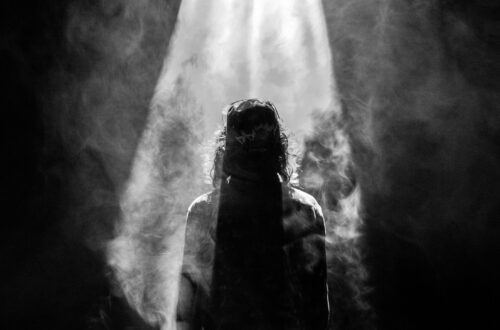
The 10 Commandments: The Truth Most People Miss About God’s Powerful Blueprint

Exodus 20:1-17 (KJV)
1] Thou shalt have no other gods before me. (Exodus 20:3)
2] Thou shalt not make unto thee any graven image, or any likeness of any thing that is in heaven above, or that is in the earth beneath, or that is in the water under the earth:
Thou shalt not bow down thyself to them, nor serve them: for I the Lord thy God am a jealous God, visiting the iniquity of the fathers upon the children unto the third and fourth generation of them that hate me; And shewing mercy unto thousands of them that love me, and keep my commandments. (Exodus 20:4-6)
3] Thou shalt not take the name of the Lord thy God in vain; for the Lord will not hold him guiltless that taketh his name in vain.(Exodus 20:7)
4]Remember the sabbath day, to keep it holy. Six days shalt thou labour, and do all thy work: But the seventh day is the sabbath of the Lord thy God: in it thou shalt not do any work, thou, nor thy son, nor thy daughter, thy manservant, nor thy maidservant, nor thy cattle, nor thy stranger that in within thy gates: For in six days the Lord made heaven and earth, the sea, and all that in them is, and rested the seventh day: wherefore the Lord blessed the sabbath day, and hallowed it. (Exodus 20:8-11)
5] Honour thy father and thy mother: that thy days may be long upon the land which the Lord thy God giveth thee. (Exodus 20:12)
6] Thou shalt not kill. (Exodus 20:13)
7] Thou shalt not commit adultery. (Exodus 20:14)
8] Thou shalt not steal. (Exodus 20:15)
9] Thou shalt not bear false witness against thy neighbor. (Exodus 20:16)
10] Thou shalt not cover thy neighbor’s house, thou shalt not covet thy neighbor’s wife, nor his manservant, nor his maidservant, nor his ox, nor his ass, nor any thing that is thy neighbor’s. (Exodus 20:17)
To study the full Book of Exodus, you can read it here.
The First Commandment: Light Through Devotion, Darkness Through Idolatry

The first commandment, “Thou shalt have no other gods before me. (Exodus 20:3), is more than a rule– it is the foundation of living in God’s light. When we put anything above God—wealth, pride, relationships, or desires—we drift away from the Source of truth and guidance. Darkness is not merely the absence of light; it is the presence of confusion, deception, and despair that fills the space where God’s light once shone. Without His light, we wander in shadows, unable to discern truth from lies and hope from hopelessness. Jesus declared, “I am the light of the world: he that followeth me shall not walk in darkness, but shall have the light of life” (John 8:12).
When we obey the first commandment, we not only remain anchored in His radiant truth but also experience lasting peace and guidance. Forsaking it invites chaos and darkness, cutting us off from the life and joy only the light of Christ provides. When God isn’t first, emptiness slowly creeps in; eventually, like running on fumes, we feel its heavy weight.
Biblical Example:
The story of the Golden Calf in Exodus 32 illustrates the First Commandment: “You shall have no other gods..
While Moses stayed on Mount Sinai, the Israelites grew impatient and made a golden calf to worship as their god. As a result, this act of idolatry broke the first commandment by placing a false god before the true God.
Why is was important to follow:
- God’s exclusive sovereignty demands wholehearted devotion. Idolatry dilutes faith and breaks the covenant relationship between God and His people.
- The golden calf symbolized a rejection of God’s authority and a return to pagan worship, undermining Israel’s identity as God’s chosen people.
Consequences for not following:
- Immediate divine wrath: God’s anger burned hot, and Moses interceded to save the nation from complete destruction.
- Severe judgment happened when The Levites killed about 3,000 people for participating in idolatry (Exodus 32:27-28).
- Broken fellowship: The event caused deep spiritual fracture and loss of God’s favor, impacting Israel’s unity and journey.
- Long-term impact: The golden calf incident became a lasting example of the dangers of idolatry and unfaithfulness, frequently referenced in later Scripture (Acts 7:41).
This story shows that breaking the first commandment leads to spiritual separation, broken relationships, and judgment—revealing the need for devotion.
The Second Commandment: Worshiping the Creator, Not the Created
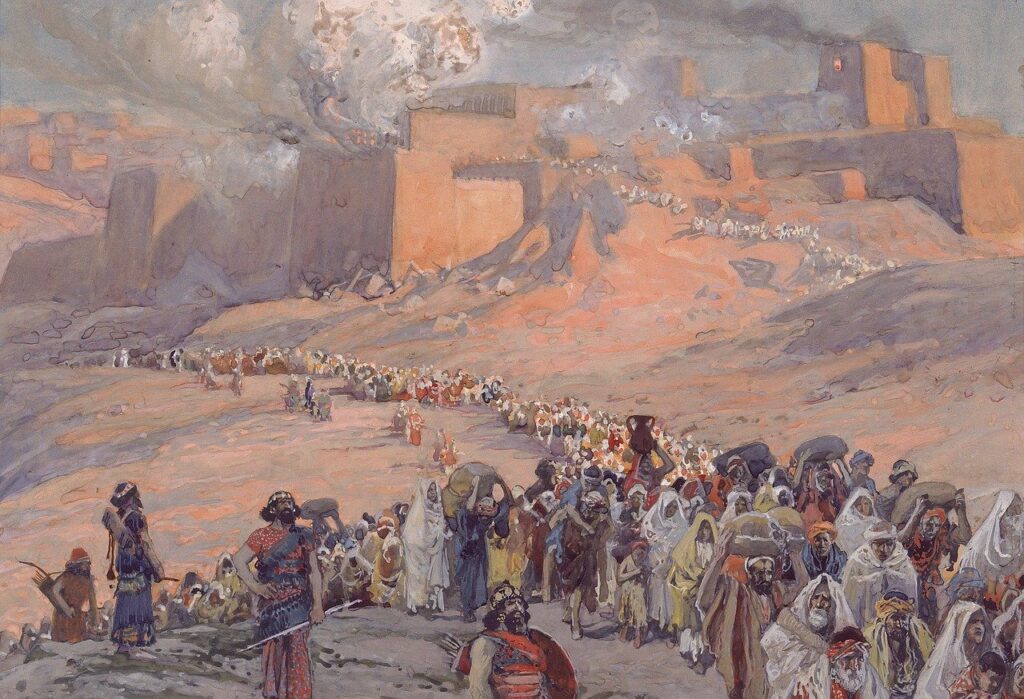
The second commandment, “Thou shalt not make unto thee any graven image…” (Exodus 20:4-6), warns us against creating or worshiping idols– whether they are carved from stone, cast in gold, or formed in the desires of our hearts. This commandment is not only about statues or false gods; it is about replacing the living God with anything that takes His place in our devotion. Idolatry distorts His image, confining the infinite Creator to something finite and powerless. When we worship the created instead of the Creator, we exchange light for shadows and truth for deception. Darkness comes when we give our allegiance to lifeless things, believing they can give what only God can provide– security, identity, or hope. In contrast, the light of God reveals His true nature: living, present, and unmatched in glory. Jesus reminded us in John 4:24, “God is a Spirit: and they that worship him must worship him in spirit and in truth.” To ignore this commandment is to risk living in the illusion of control, trapped in cycles of disappointment when our “gods” fail us. But when we honor it, we remain in the radiance of God’s presence, guided by His Spirit rather than the empty promises of idols. I’ve learned that idols can be anything we think we can’t live without, and sometimes they sneak in so quietly we don’t even notice until our peace is gone and we feel resentment for NOT having such things we desire.
Example from the Bible:
Daniel 3 shows a clear violation of the second commandment with King Nebuchadnezzar’s massive golden image. He ordered everyone in Babylon to bow and worship the statue whenever they heard the sound of music. Shadrach, Meshach, and Abednego refused, honoring God alone and were protected by God because they followed the commandment.
Consequences for Breaking It:
Those who obeyed the king’s command turned their hearts to the image, deepening their spiritual blindness. Idolatry bound the people to the king’s price and control, replacing God’s truth with human arrogance.
Those who refused to bow—Shadrach, Meshach, and Abednego—were thrown into a blazing furnace for their defiance. In the fire, God’s presence preserved them, revealing His power and authority over all idols and false gods.
This story shows that idolatry enslaves the soul to chaos– false gods offer no light, only the illusion of power. Choosing the living God keeps us in His unshakable light, where no human-made image can bind or destroy us. Worshiping Him alone is freedom, truth, and life.
The Third Commandment: Honoring God’s Name as Light in a World of Empty Words
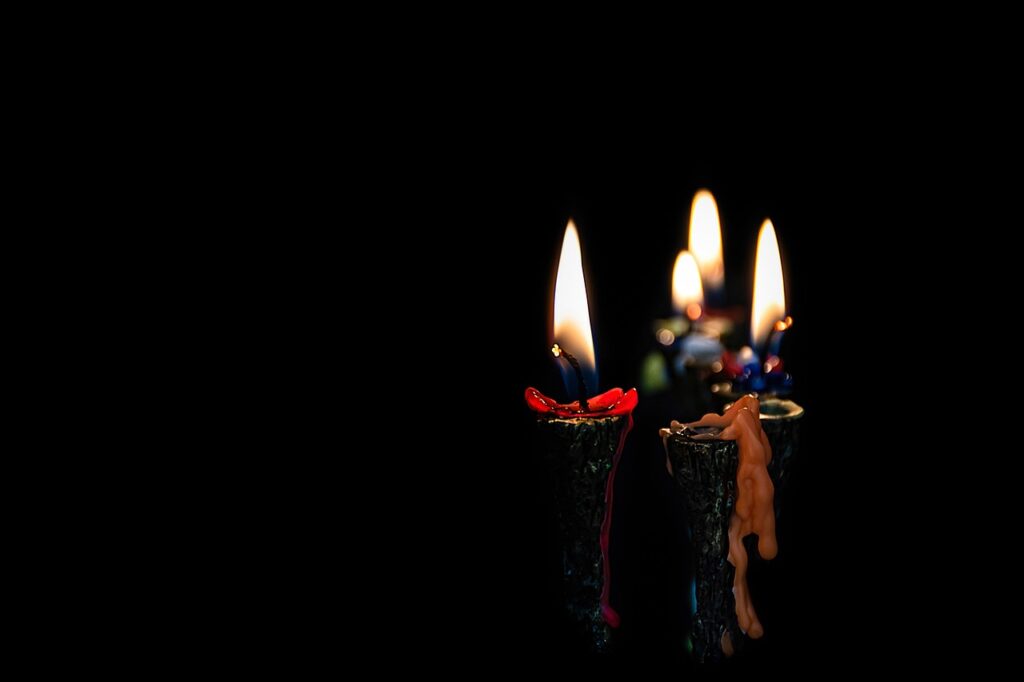
The third commandment, “Thou shalt not take the name of the Lord thy God in vain” (Exodus 20:7), is about more than avoiding careless speech. It calls us to treat God’s name– the very essence of His character– with reverence and truth. God’s name is tied to His holiness, His covenant promises, and His authority. When we use it lightly, falsely, or hypocritically, we diminish our witness and dishonor the One who is the source of light and truth. This commandment reminds us that our words have power– they can shine like a lamp in the darkness or spread confusion and distrust. To misuse God’s name is to let the shadow of deceit fall over His glory, giving space for chaos to grow. Jesus taught that our “yes” should mean yes, and our “no” should mean no (Matthew 5:37), reflecting integrity in all speech. When we honor this commandment, we keep our lives aligned with the light of truth, becoming trustworthy vessels of His message. But when we neglect it, we risk clouding God’s light, replacing it with the dim and unstable flicker of human pride, empty promises, or lies. It’s a good heart check to ask ourselves– are my words lifting His name higher, or are they making Him look small in the eyes of others?
Biblical Example:
In Acts 19:13–16, Jewish exorcists misused Jesus’ name without truly knowing Him—and were overpowered by the very demons they confronted. The evil spirit overpowered them, leaving them beaten and humiliated.
Light vs Chaos Tie-In:
Misusing God’s name without relationship or reverence opens the door to chaos, shame, and defeat. But honoring His name keeps us anchored in His authority and shining with His light, even in spiritual battle.
The Fourth Commandment: Resting in God’s Light, Resisting the Chaos of Endless Striving

Now to the fourth commandment, “Remember the sabbath day, to keep it holy” (Exodus 20:8-11), is God’s reminder that rest is not laziness– it is worship. In a world obsessed with constant activity, achievement, and self-reliance, the Sabbath calls us back to the light of God’s presence, where our value comes from Him, not from our endless labor. Setting aside a day for rest honors God as Creator, acknowledging that HE is the source of all provision. Ignoring this commandment may not bring immediate disaster, but it invites subtle chaos– burnout, spiritual dryness, and strained relationships. The light of the Sabbath renews our spirit, clears our vision, and strengthens our connection with God. Jesus said, “The Sabbath was made for man, not man for the Sabbath,” showing it’s a gift, not burden. When we embrace Sabbath rest, we align ourselves with God’s rhythm and are refreshed in His peace. When we reject it, we trade light for exhaustion and clarity for confusion, becoming too weary to hear His voice. When I skip rest too long, I become impatient and stressed—and that’s not how God wants us to live.
Bible Example:
In Numbers 15:32-36, the community judged a man harshly for gathering wood on the Sabbath, openly rebelling against God’s authority.
Light vs Chaos Tie-In:
The Sabbath is God’s beacon in a restless world. To honor it is to walk in His light; to neglect it is to stumble into the chaos of self-dependence and spiritual emptiness.
The Fifth Commandment: Honoring Authority as a Pathway to God’s Light and Order
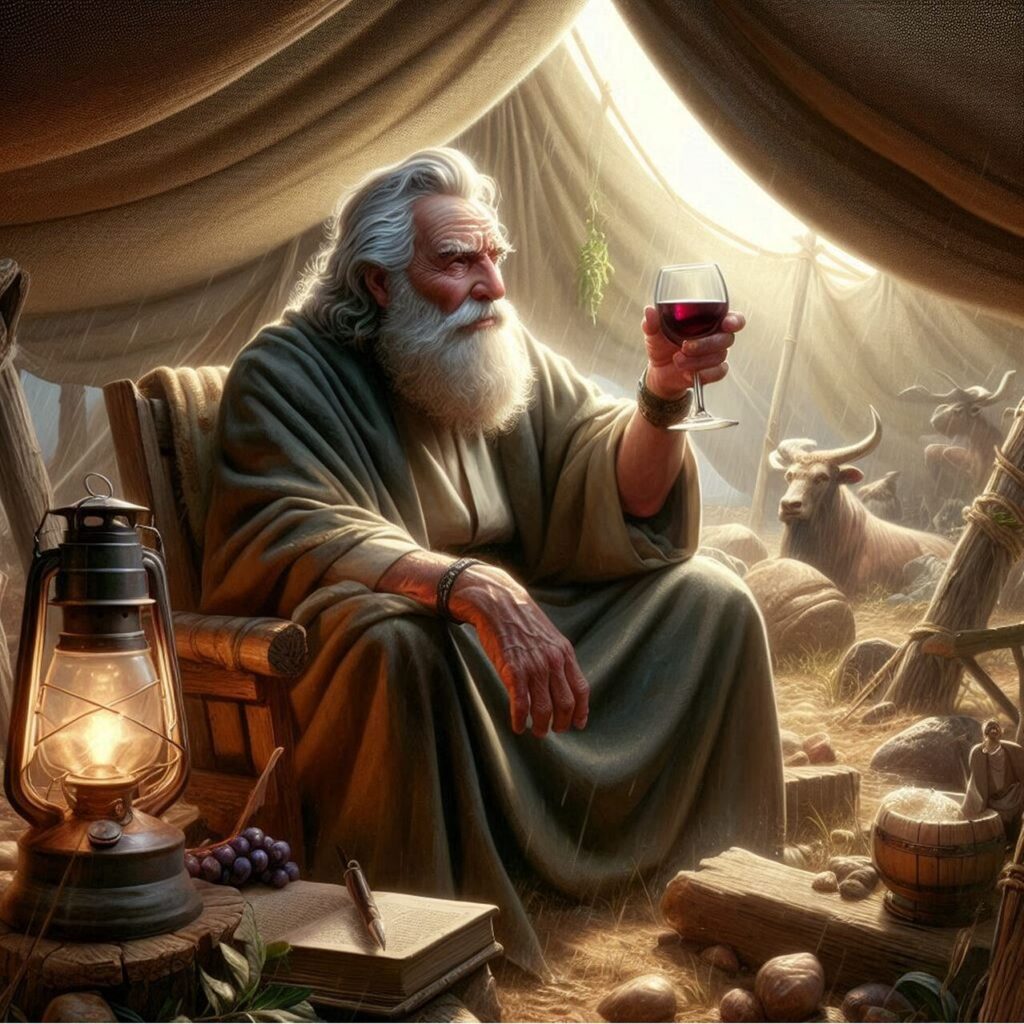
The fifth commandment, “Honour thy father and thy mother: that thy days may be long upon the land which the LORD thy God giveth thee” (Exodus 20:12), teaches us that respect for God-given authority is essential to a life grounded in His light. This commandment reaches beyond family– it lays the foundation for honoring all rightful authority God places in our lives. By respecting and valuing our parents, we acknowledge God’s order and wisdom in the family structure. Disregard for this principle breeds chaos, rebellion, and a breakdown of relationships. Honoring parents does not mean ignoring wrongdoing or enduring abuse– it means showing respect for the role and the design God intended, as far as it aligns with His truth. When this commandment is followed, it strengthens families, communities, and generations. When it is broken, the light unity dims, replaced by division, bitterness, and instability. In God’s design, honoring brings blessing; dishonor invites decay. Sometimes honoring someone is more about our own heart posture than whether they’ve earned it or not, which can be very hard to do.
Biblical Example:
In Genesis 9:20-27, Ham dishonored his father Noah by mocking him rather than covering his shame. As a result, Ham’s son Canaan was cursed, showing how dishonor can bring generational consequences. Today, that can also be known as generational curses.
Light vs Chaos Tie-In:
Honor builds stability and reflects God’s light into the next generation. Dishonor unleashes chaos, disrupting the flow of blessing and replacing harmony with strife.
The Sixth Commandment: Preserving Life as a Reflection of God’s Light
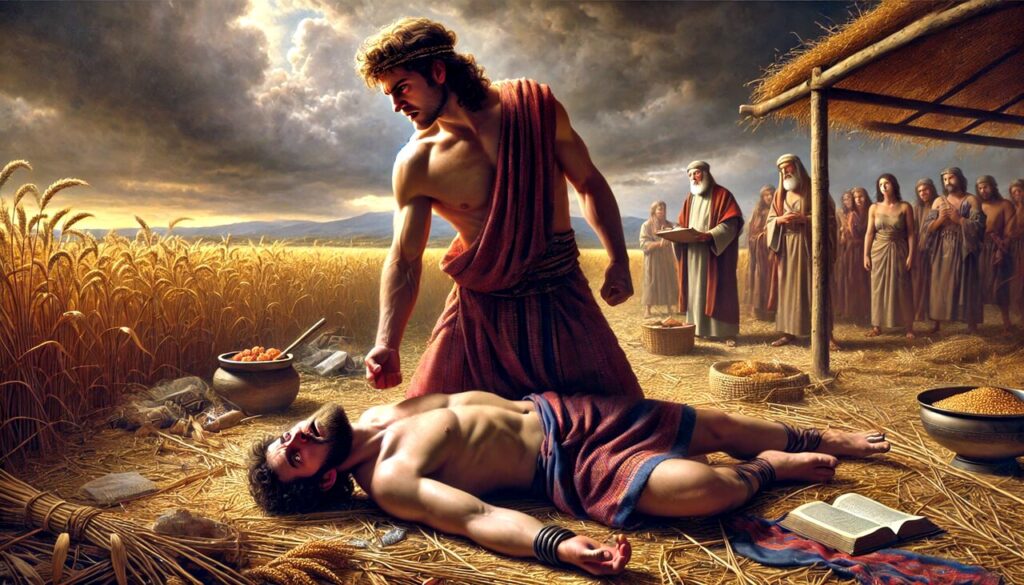
The sixth commandment, “Thou shalt not kill” (Exodus 20:13), is more than a prohibition against physical murder– it is a call to honor the sacredness of life itself. All human life is created in the image of God (Genesis 1:27), and to take it unjustly is to attack the very imprint of the Creator. Life is one of God’s greatest gifts, and preserving it reflects His light in a world marred by violence, hatred, and disregard for others. The darkness that follows the breaking of this commandment is not limited to the act itself– it spreads into grief, cycles of revenge, and societal instability. Jesus deepened this commandment in Matthew 5:21-22, teaching that even harboring hatred in the heart is a seed of murder, for it destroys peace and breeds chaos within. To obey this commandment is to protect the light of life and the dignity of every soul. To ignore it is to open the door to chaos of destruction, where the value of life becomes negotiable and love is replaced with fear. And even if we never lift a hand in violence, holding bitterness is like slowly turning out the light in our own heart.
Biblical Example:
In Genesis 4:1-16, Cain murdered his brother Abel out of jealousy and anger. The consequence was exile, a cursed ground, and a life of wandering without peace.
Light vs Chaos Tie-In:
Choosing to preserve life is choosing God’s light; choosing to destroy it invites darkness, separation, and unending unrest.
The Seventh Commandment: Faithfulness is Love as a Witness of God’s Light

The seventh commandment, “Thou shalt not commit adultery” (Exodus 20:14), protects the sacred covenant of marriage– a relationship designed to reflect God’s faithful love for His people. Adultery is not just a betrayal of a spouse; it is a distortion of truth, trust, and the unity that God established. The light of this commandment points us to loyalty, purity, and honor, while breaking it ushers in the darkness of broken families, emotional wounds, and mistrust. Jesus expanded this commandment in Matthew 5:27-28, revealing that lust in the heart of adultery in seed form, for it corrupts the soul before the act is ever committed. When this commandment is honored, marriages become beacons of stability and love in a chaotic world. When it is broken, the ripple effects can affect generations. The truth is, faithfulness is a daily choice– and every small choice builds a wall of trust or chips away at it.
Biblical Example:
In 2 Samuel 11, King David committed adultery with Bathsheba, leading to lies, the murder of her husband Uriah, and lasting turmoil in David’s household.
Light vs Chaos Tie-In:
Faithfulness keeps relationships rooted in God’s light; unfaithfulness unleashes chaos, shattering trust and dimming the witness of His love.
The Eighth Commandment: Integrity in Possession as a Path of Light
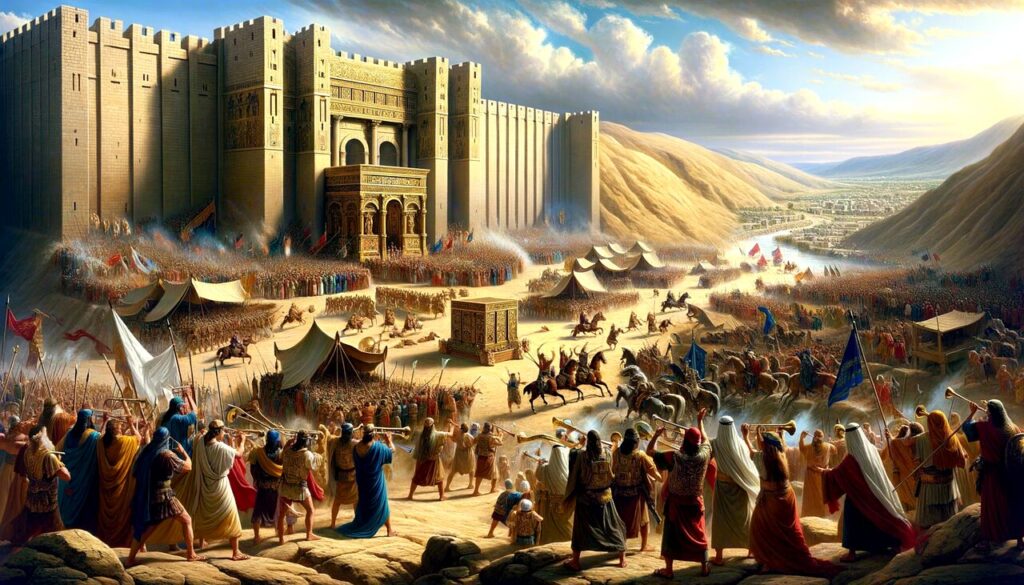
The either commandment, “Thou shalt not steal” (Exodus 20:15), affirms God’s value on honesty, stewardship, and respect for others. Theft is not only the taking of physical goods– it is also robbing time, credit, opportunities, or dignity from another. To steal is to act in darkness, driven by greed, distrust in God’s provision, or disregard for others. This breaks the harmony of the community and replaces light with suspicion and loss. Honoring this commandment means trusting God as our provider and respecting the boundaries He has set. In Ephesians 4:28, Paul urges, “Let him that stole steal no more: but rather let him labour…that he may have to give him that needeth.” This shifts our role from takers to givers, spreading light instead of chaos. If we really believe God is our provider, we won’t feel the need to take what was never meant for us.
Biblical Example:
In Joshua 7, Achan stole forbidden items from Jericho, and Israel’s army suffered defeat. His hidden sin brought judgment not only on himself but also on the entire community.
Light vs Chaos Tie-In:
Integrity builds trust and unity in God’s light; theft invites chaos, broken fellowship, and loss of God’s favor.
The Ninth Commandment: Truth as a Shield of Light

The ninth commandment, “Thou shalt not bear false witness against thy neighbour” (Exodus 20:16), safeguards truth, justice, and the protection of others’ reputations. Bearing false witness is more than lying– it is using words as weapons, spreading deception that can destroy lives. In God’s light, truth brings freedom (John 8:32); in darkness, lies entangle us in fear, suspicion, and broken trust. This commandment reminds us that our speech reflects the state of our heart– truth-telling aligns us with God, the source of all truth, while deceit aligns us with the chaos of the enemy, the “father of lies” (John 8:44). Words have the power to build up or to tear down; this commandment calls us to speak only what is good and righteous. Our words can be a lighthouse or wrecking ball– and we decide which every time we open our mouth.
Biblical Example:
In 1 Kings 21, false witnesses accused Naboth so King Ahab could seize his vineyard. Naboth was killed, and God’s judgment fell on Ahab and Jezebel for their corrupt plot.
Light vs Chaos Tie-In:
Truth shields relationships and communities in God’s light; lies unleash chaos, injustice, and destruction.
The Tenth Commandment: Contentment as a Light Against the Shadows of Envy
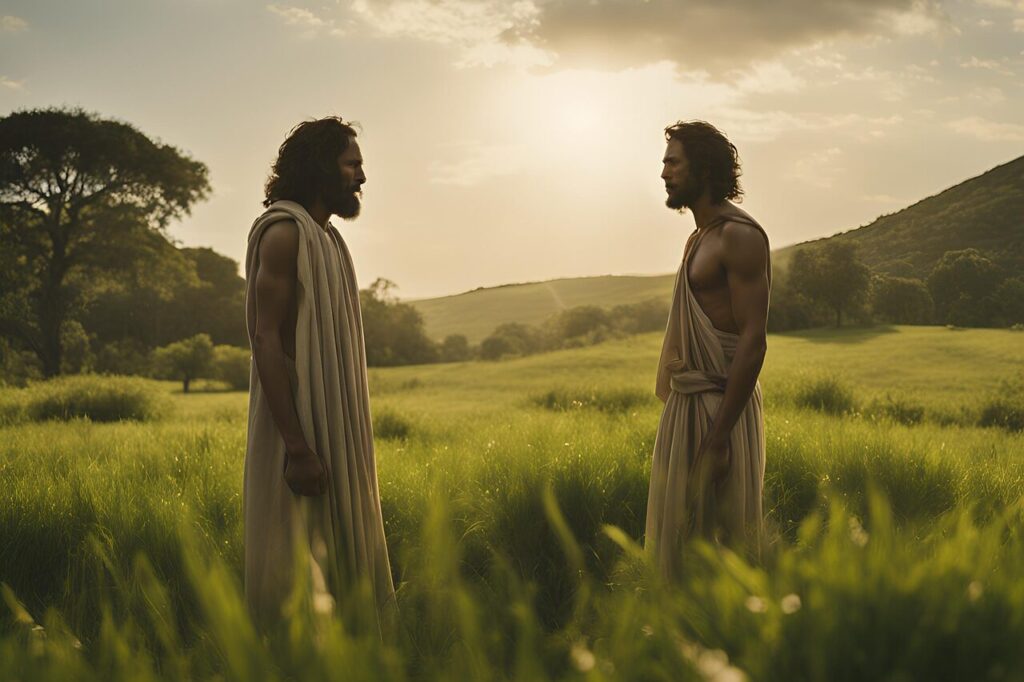
The tenth commandment, “Thou shalt not covet… (Exodus 20:17), addresses the desires of the heart, showing that sin often begins in what we long for before it appears in action. Coveting is more than wanting something– it is allowing desire to grow into resentment, entitlement, and discontent. In God’s light, contentment protects us from the endless grasping that fuels chaos. Hebrews 13:5 reminds us, “Be content with such things as ye have: for he hath said, I will never leave thee, nor forsake thee.” When we covet, we shift our focus from the blessings God has given us to what we think we deserve, opening the door to jealousy, division, and even further sins like theft, adultery, or deceit. I’ve found that gratitude is the quickest way to slam the door in envy’s face.
Biblical Example:
In Genesis 4, Cain coveted the favor God gave to Abel’s offering. This envy consumed him, leading to murder and a lifetime of wandering under God’s judgment.
Light vs Chaos Tie-In:
Contentment anchors us in God’s light, fostering gratitude and peace; coveting pulls us into chaos, where comparison and resentment destroy joy.
Choosing the Light in Every Step We Take

The Ten Commandments are more than ancient rules– they are God’s blueprint for living in His light and avoiding the chaos that consumes the world. Each one protects us from the traps of idolatry, dishonor, deception, and discontent, leading us instead into truth, peace and blessing. When we choose God’s way over the world’s way, we walk in the steady glow of His presence rather than stumbling under the world’s heavy blanket of darkness.
Previously, I shared how Jesus is the light who guides us through life’s darkest moments. Similarly, the Ten Commandments shows us how to walk in that same light daily. Therefore, if you missed that post, you can read it here to explore this truth further.
[Optional Prayer]:
Father God, thank You for giving us Your commandments as a light to guide our steps in a world that often feels dark and confused. Help us to see the places in our lives where we have allowed shadows to grow, and give us the strength to turn back toward Your truth. Teach us to love what You love, reject what pulls us into chaos, and walk each day in the freedom and peace that only comes from Your light. Jesus’ name, Amen.


